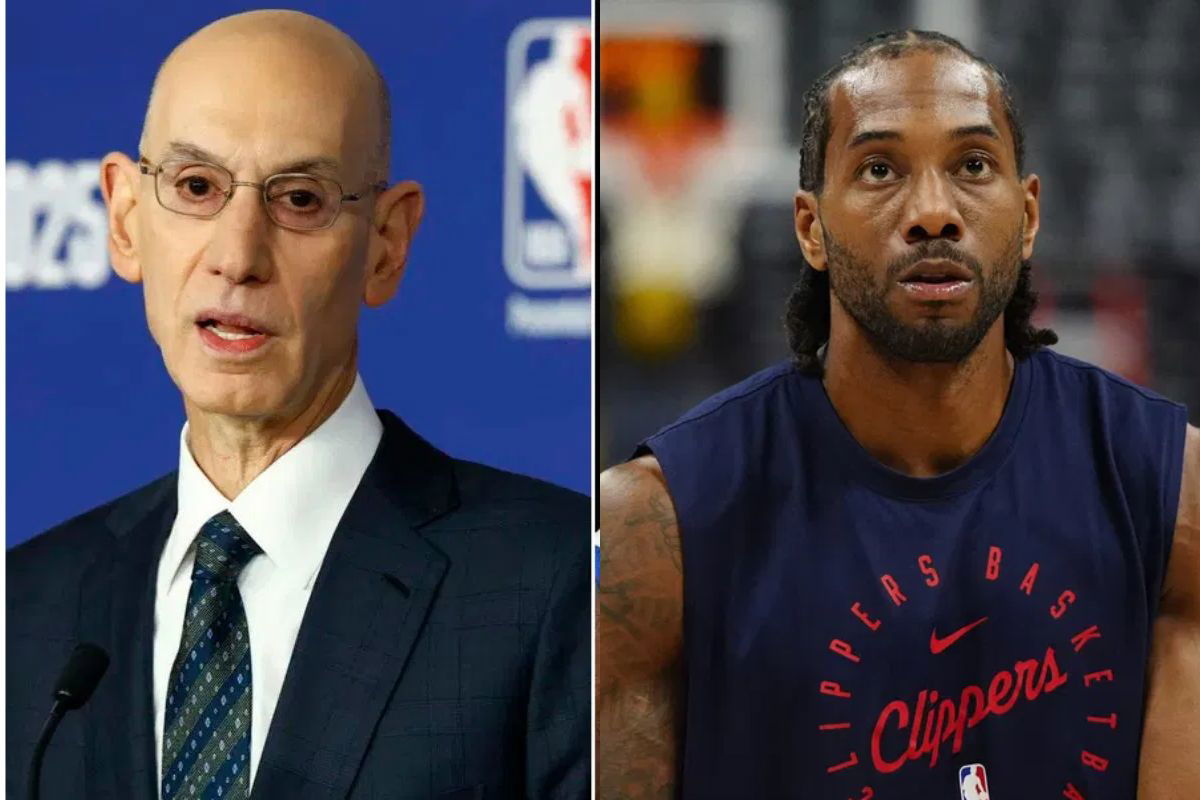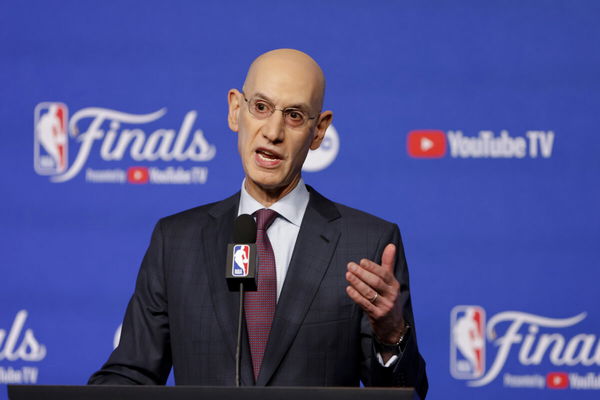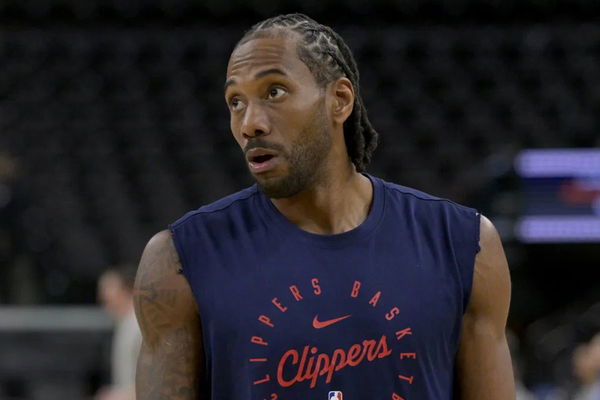

Kawhi Leonard’s silent game has never been louder. The superstar who dropped monstrous playoff moments and guarded the rim like a wall now sits at the center of one of the NBA’s most explosive reputation tests. A $28 million endorsement with a bankrupt company and reported ties to Clippers ownership have forced Adam Silver into a familiar but threatened area of policing fairness while protecting the league’s brand. Speaking live, the commissioner drew a line back to the league’s other big brand headache in recent years.
Watch What’s Trending Now!
Pablo Torre’s investigation put the money and the questions on the table. The reporting alleges a $28 million Aspiration deal for Leonard that, critics say, functioned like a “no-show” payment, cash that curiously lined up with Clippers business moves and owner investments. The result? An investigation. Adam Silver walked directly into it. Silver didn’t dodge the stakes when asked live. He told reporters the league will investigate and hire outside counsel if needed. “We can hire outside law firms. We have some in-house investigators,” he said.
He also noted the sheer volume of deals the league tracks and admitted the process can’t reasonably vet every executive involved in every agreement. “We may have to rethink those rules,” Silver added, saying the league owes fans and teams an even playing field. Silver said the league’s vetting process didn’t always go deep enough, and the Aspiration case should force the NBA to reconsider whether deals tied to players and teams require tighter rules, the same way crypto deals once did. In his words, the Kawhi situation echoes the turbulence of crypto sponsorships.
ADVERTISEMENT
“I mean, let’s go back to those deals. I mean, should we have been doing things we didn’t do? We’re still, and now crypto’s back up. We have deals with some of the crypto companies now, and now they’re, you know, the market’s killing, you know, going crazy on crypto.” That comparison is telling. Crypto once flooded NBA floors and jerseys before the collapse of FTX, and others left reputational scars. Aspiration, a supposedly green investment company with Clippers ties, has put Leonard and the franchise under the same microscope. The question Silver left hanging, though? How many more landmines like this exist in the NBA’s web of team and player business deals?
He framed the problem in big-picture terms. This is a “market economy,” he said. Owners, players, and third parties all move in that world. However, where those private deals bleed into competitive realities, the commissioner’s role is to protect integrity. “My responsibility ultimately is the integrity of this league,” Silver said. He vowed due process and fairness and warned that the consequences would be real if competitive fairness were compromised. Yet calling out the problem is one thing. Fixing it is another.

Imago
Jun 5, 2025; Oklahoma City, Oklahoma, USA; NBA commissioner Adam Silver speaks to the media before game one between the Oklahoma City Thunder and the Indiana Pacers in the 2025 NBA Finals at Paycom Center. Mandatory Credit: Alonzo Adams-Imagn Images
The CBA’s Article XIII gives Silver a menu of blunt options. However, the harshest measures go even further by voiding Leonard’s contract entirely, blocking him from re-signing in Los Angeles, and forcing him to return the $28 million he received through the Aspiration deal. The toothiest precedents run deep. In 1999, the league punished circumvention by stripping picks and voiding contracts.
ADVERTISEMENT
That Joe Smith case remains the benchmark for “what happens next” when the league proves intentional cap-skewing. Earlier this month, Silver said the league has “very broad powers” to act if wrongdoing is found.
ADVERTISEMENT
Top Stories
Lakers Reporter Drops Luka Doncic Injury Update After Injury Exit vs 76ers

“Hated Kristaps Porzingis on Our Team”: NBA Legend Gets Brutally Honest After Warriors’ Jonathan Kuminga Trade

“I’m Sorry”: Steve Kerr Makes Emotional Confession After Jonathan Kuminga Trade

Chris Paul Thrown Out of Country for $7M as Clippers Trade Deepens Future Uncertainty

“Doesn’t Happen Without Steph Curry”: Steve Kerr Credits Warriors Star for Caitlin Clark’s Fandom

Adam Silver’s options, and the catches
If the Clippers are found guilty of circumvention, the penalties are severe on paper. With the help of the CBA’s Article XIII, Silver could fine the franchise up to $7.5 million and dock Kawhi Leonard as much as $350,000. He could strip the Clippers of multiple future draft picks, the most painful blow for any front office. He also has the authority to suspend owner Steve Ballmer or other team executives for up to a year, with additional fines reaching $1 million each. But the remedy comes with its own risks.

Imago
Mar 21, 2025; Inglewood, California, USA; Los Angeles Clippers forward Kawhi Leonard (2) warms up prior to the game against the Memphis Grizzlies at Intuit Dome. Mandatory Credit: Jayne Kamin-Oncea-Imagn Images
Voiding Kawhi’s deal could free up enormous cap room for the Clippers mid-cycle, or, paradoxically, leave them with the cap hit and no player. Either outcome would scramble the free-agent market and create chaos during the season. The Timberwolves’ Joe Smith punishment showed how damaging forfeited picks can be. Yet voiding a superstar contract carries an additional, thorny wrinkle as it could transform a corrective action into an unanticipated competitive windfall or disturbance. Silver acknowledged as much.
ADVERTISEMENT
He raised the possibility that the league might instead place the Aspiration money on the Clippers’ cap or pursue a mix of sanctions that punish without creating perverse incentives. He also warned of competing complaints from owners and players, as some owners argue that the current rules unfairly limit investment structures. In contrast, some players push back against owner stakes in companies that employ athletes. The commissioner is balancing two separate responsibilities: enforcement and rule-making. Then there’s timing.
Investigations take months. Legal hearings and arbitration could stretch into the season. If a decision lands midyear, the league will face the worst-case scenario with a superstar suddenly untethered from his contract or a team with an unexpected cap hole. Suspending a player until the summer could avoid mass disruption, but would invite labor fights and public outrage. So what does Adam Silver actually do? He has the tools.
ADVERTISEMENT
He also has trade-offs. He can seek drastic punishments to send a message. Or he can engineer penalties that strip ill-gotten advantages without reshaping the league’s competitive map overnight. Either route will make enemies. What happens next will matter. A precedent here could deter future skirted deals or reveal limits to the commissioner’s reach. It’s a defining moment for the commissioner’s office and the game’s rules.
ADVERTISEMENT
ADVERTISEMENT
ADVERTISEMENT